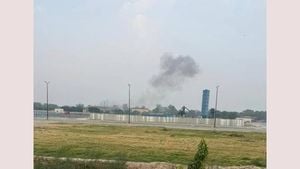President Donald Trump has signed an executive order mandating that all commercial truck drivers operating in the United States demonstrate proficiency in English. This directive, issued on April 28, 2025, aims to enhance road safety and improve communication among truckers, federal officials, and local authorities.
The order reinforces an existing federal law that requires English-language proficiency for commercial drivers, which has reportedly not been enforced for years. In the text of the order, Trump emphasized the importance of this requirement, stating, "My Administration will enforce the law to protect the safety of American truckers, drivers, passengers, and others, including by upholding the safety enforcement regulations that ensure that anyone behind the wheel of a commercial vehicle is properly qualified and proficient in our national language, English."
White House press secretary Karoline Leavitt elaborated on the necessity of the order during a press briefing, highlighting the communication challenges that arise between truckers and officials. "There’s a lot of communication problems between truckers on the road, which is a public safety risk," Leavitt stated. "We’re going to ensure that our truckers, who are the backbone of our economy, are all able to speak English. That’s a very commonsense policy in the United States of America."
Under the new order, truck drivers will be required to pass English literacy tests, which will be overseen by Transportation Secretary Sean Duffy. The directive tasks Duffy with rescinding previous guidance that had diluted the enforcement of English proficiency requirements. Drivers unable to demonstrate their proficiency will be placed out-of-service, thereby enhancing roadway safety.
The administration's push for this order comes amid rising concerns about trucking-related fatalities and communication barriers that have been reported between drivers and public safety officials. The order specifies that drivers must be able to read and understand traffic signs, communicate effectively with law enforcement and other officials, and provide and receive instructions in English.
This new executive order marks a significant shift from policies established during the Obama administration, which had previously allowed for a more lenient approach to English proficiency requirements for commercial drivers. In fact, the Obama administration had stopped enforcing the English requirement altogether in 2016. In contrast, the Biden-Harris administration in 2024 had promoted initiatives to increase truck driving training opportunities for refugees, which led to an influx of foreign-born truckers in the industry.
Trump's recent actions regarding English language requirements do not stop here. Just a month prior to signing this order, he declared English as the official language of the United States, a move that has been met with mixed reactions. Critics of this decision, particularly from the Congressional Tri-Caucus, have expressed concerns that such policies may discriminate against non-English-speaking communities and restrict access to federal services. They described the official language designation as a "thinly veiled attempt" to marginalize individuals with limited English proficiency.
In support of the executive order, Todd Spencer, president of the Owner-Operator Independent Drivers Association (OOIDA), stated that "basic English skills are essential for reading critical road signs, understanding emergency instructions, and interacting with law enforcement." The OOIDA represents approximately 150,000 truckers and has voiced strong support for the enforcement of English proficiency requirements for commercial drivers.
However, the order has faced criticism on social media, where some have mocked the policy as being out of touch with the pressing issues facing the trucking industry, such as rising inflation and infrastructure challenges. One commentator remarked, "Nothing screams fixing America like hunting down accents while bridges collapse and inflation guts the country."
Despite the backlash, the Trump administration remains firm in its belief that English proficiency is a non-negotiable safety requirement for professional drivers. The order aims to address what the administration describes as a critical issue for the safety of the nation's roadways, asserting that the ability to communicate effectively is vital for truckers who play a crucial role in transporting goods across the country.
The implications of this executive order could be significant for the trucking industry. Drivers who do not meet the English proficiency standards may need to undergo language training or face restrictions on their ability to operate within the United States. As the nation continues to navigate economic challenges, including trade tensions and supply chain disruptions, the role of truck drivers is expected to become even more vital.
In conclusion, President Trump's executive order mandating English proficiency for commercial truck drivers reflects a broader strategy to enhance public safety and streamline communication within the trucking industry. While proponents argue that it is a commonsense measure, critics warn of potential discrimination against non-English speakers. As the trucking industry evolves, the enforcement of this order will likely spark ongoing debates about language, safety, and the future of transportation in America.






